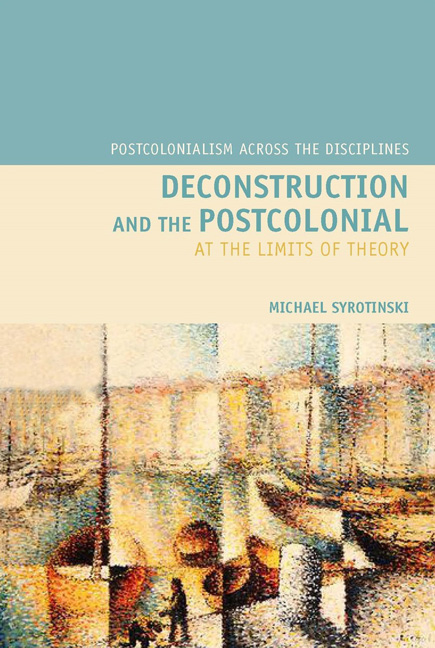Book contents
- Frontmatter
- Dedication
- Contents
- Acknowledgements
- Introduction: a few liminal remarks
- Part I Postcolonial deconstruction
- 1 Deconstruction in Algeria (Derrida ‘himself’)
- 2 Hybridity revisited
- 3 Spivak reading Derrida: an interesting exchange
- Part II Deconstruction and postcolonial Africa
- Conclusion (Postcolonial Blanchot?)
- Bibliography
- Index
3 - Spivak reading Derrida: an interesting exchange
from Part I - Postcolonial deconstruction
- Frontmatter
- Dedication
- Contents
- Acknowledgements
- Introduction: a few liminal remarks
- Part I Postcolonial deconstruction
- 1 Deconstruction in Algeria (Derrida ‘himself’)
- 2 Hybridity revisited
- 3 Spivak reading Derrida: an interesting exchange
- Part II Deconstruction and postcolonial Africa
- Conclusion (Postcolonial Blanchot?)
- Bibliography
- Index
Summary
At the end of the previous chapter, hybridity was conceived of as a double articulation that would allow for a move beyond the hegemonic absorptions of identitarian thinking, or of a politics of subjective agency, and we saw the critical potential of Homi Bhabha's ‘savage hybridity’ in this regard. As Alberto Moreiras notes, Gayatri Spivak's ‘strategic essentialism’ provides one early model for such a double articulation, in this case one that would address the apparent logical impossibility of finding a way to give voice and agency to subaltern women, when all access is by definition denied according to the law of the discursive power of hegemony. He also alludes to Jacques Derrida's Specters of Marx as another, more recent version of such a double articulation, albeit within a different context and in a different register, and thus suggests a certain theoretical consonance uniting the respective projects of Spivak and Derrida. Spivak's relationship to Derrida is clearly central to any understanding of a deconstructive postcolonial theory, and what I would like to do in this chapter is to test this hypothesis of a theoretical alliance. The traffic is admittedly one way for much of the time, since, while Spivak has continuously invoked and incorporated the lessons of deconstruction in her own work, Derrida has on only one occasion engaged directly with Spivak, and this was precisely in the context of the polemical exchange following the publication of Specters of Marx. This will, not surprisingly, be the central focus of the chapter, although I would like to set the scene for this encounter by looking at Spivak's ‘appropriation’ (the word is both carefully chosen and carefully suspended) of deconstruction and how she has negotiated her relationship to Derrida. The discussion of her reading of Specters of Marx will then also open out on to the larger questions that it raises about the political effectiveness of deconstructive thinking within colonial and postcolonial contexts, and in particular what Spivak sees as the two most significant limits of deconstruction, namely its inattention to contemporary forms of exploitation of subaltern women, and its inability to account for the realities and effects of globalization and multinational finance capital.
- Type
- Chapter
- Information
- Deconstruction and the PostcolonialAt the Limits of Theory, pp. 40 - 62Publisher: Liverpool University PressPrint publication year: 2007

